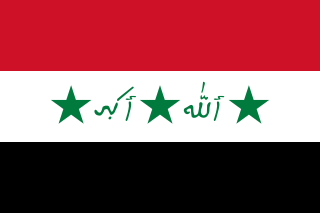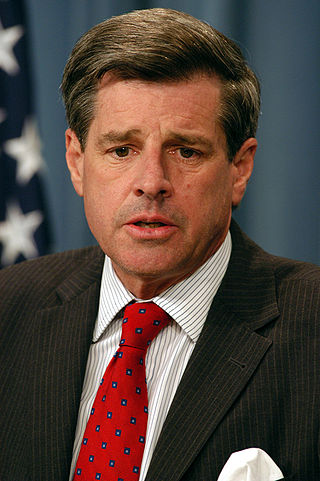Mukhābarāt, is the Arabic term for intelligence, as used by an intelligence agency. In most of the Middle East, the term is colloquially used in reference to secret police agents who spy on civilians. Organizations using the name include:

The Coalition Provisional Authority was a transitional government of Iraq established following the invasion of the country on 19 March 2003 by U.S.-led Coalition forces. The invasion marked the fall of Ba'athist regime led by Saddam Hussein.

Lewis Paul Bremer III is a retired American diplomat. He was the second de facto head of state of Iraq as leader of the Coalition Provisional Authority (CPA) following the 2003 invasion of Iraq by the United States, from May 2003 until June 2004.

Ayad Allawi is an Iraqi politician. He served as the vice president of Iraq from 2014 to 2015 and 2016 to 2018. Previously he was interim prime minister of Iraq from 2004 to 2005 and the president of the Governing Council of Iraq in 2003.
The General Security Directorate (GSD) was the intelligence agency of Iraq. Although details on its organisation were not made clear at the time, the General Security Directorate's designated mission was to "infiltrate and annihilate Iraq's tenacious insurgency".

The Badr Organization, previously known as the Badr Brigades or Badr Corps, is an Iraqi Shia Islamist political party and paramilitary organization headed by Hadi Al-Amiri. The Badr Brigade, formed in 1982 and led by Iranian officers, served as the military arm of the Supreme Council for Islamic Revolution in Iraq (SCIRI), a Shia Islamic party based in Iran. The Badr Brigade was created by Iranian intelligence and Shia cleric Mohammad Baqir al-Hakim with the aim of fighting Saddam Hussein's regime during the Iran–Iraq War. Since the 2003 US-led invasion of Iraq most of the Badr Brigades' fighters have entered the new Iraqi army and police force. Politically, Badr Brigade and SCIRI were considered to be one party since 2003, but have now unofficially separated with the Badr Organization now an official Iraqi political party. Badr Brigade forces, and their Iranian commanders, have come to prominence in 2014 fighting the Islamic State of Iraq and the Levant (ISIL) in Iraq. It is a part of the Popular Mobilization Forces.
In May 2003, following the invasion of Iraq in March of that year, the Central Bank of Iraq-Development Fund for Iraq (DFI) account was created at the U.S. Federal Reserve Bank of New York at the request of the Coalition Provisional Authority (CPA) Administrator. A part of the fund has been transferred to Baghdad and Iraq, and the DFI-Baghdad account was opened at the Central Bank of Iraq "for cash payment requirements". The fund also eventually received money from seized and "vested" Iraqi bank accounts and funds seized by coalition forces. $650 million of this amount belongs to Uday Saddam Hussein, the older son of the former Iraqi president. The DFI have been disbursed mainly for "the wheat purchase program, the currency exchange program, the electricity and oil infrastructure programs, equipment for Iraqis security forces, and for Iraqi civil service salaries and ministry budget operations".
The Saddam–al-Qaeda conspiracy theory was based on false claims made by the United States government, alleging that a highly secretive relationship existed between Iraqi president Saddam Hussein and the Sunni pan-Islamist militant organization al-Qaeda between 1992 and 2003. The George W. Bush administration promoted it as a main rationale for invading Iraq in 2003.
The Iraqi Intelligence Service also known as the Mukhabarat, General Intelligence Directorate, or Party Intelligence, was an 8,000-man agency and the main state intelligence organization in Iraq under Saddam Hussein. The IIS was primarily concerned with international intelligence collection and analysis but also performed many activities inside Iraq in conjunction with the Directorate of General Security as a secret police organization.

The Iraqi Special Security Organization was the most powerful Iraqi security agency under President Saddam Hussein and was responsible for personal security of high-ranking government officials and presidential facilities. This agency, in an effort to provide security to the regime and assure quality control throughout the intelligence directorates, had the authority to carry out abduction, murder, and intimidation. All was done on direct orders from the Hussein leadership. Its director, Hani Abd Al-Latif Tilfah Al-Tikriti was the seventh most wanted Iraqi government individual by the United States. He was the highest-ranking unpictured person in the U.S. Army most-wanted Iraqi playing cards. He was captured in June 2004.
The Iraqi police system was re-established following the overthrow of Saddam Hussein in 2003.
Farouk Hijazi is a former Iraqi government official who served the Iraqi government during the rulership of Saddam Hussein. Hijazi served as Hussein's Director of External Operations for the Mukhabarat, the Iraqi intelligence service for many years before becoming Iraq's ambassador to Turkey.
The Directorate of General Security (DGS) also known as Internal State Security was a domestic Iraqi intelligence agency.
Mohammed Abdullah al-Shahwani is an Iraqi general and the former director of the Iraqi National Intelligence Service.
Coalition Provisional Authority Order Number 2: Dissolution of Entities signed by Coalition Provisional Authority on 23 May 2003, disbanded the Iraqi military, security, and intelligence infrastructure of President Saddam Hussein. It has since become an object of controversy, cited by some critics as the biggest American mistake made in the immediate aftermath of the fall of Saddam Hussein and is one of the main causes of the rise of the Islamic State of Iraq and the Levant (ISIL/ISIS).
The United States (U.S.) Central Intelligence Agency (CIA) has been involved in covert actions and contingency planning in Iraq ever since the 1958 overthrow of the Iraqi monarchy, although the historiography of Iraq–United States relations prior to the 1980s is considered relatively underdeveloped, with the first in-depth academic studies being published in the 2010s.

The Ministry of Defence is the Iraqi government agency responsible for defence of Iraq. It is also involved with internal security.
The 100 Orders are "binding instructions or directives to the Iraqi people that create penal consequences or have a direct bearing on the way Iraqis are regulated, including changes to Iraqi law" created in early 2004 by Paul Bremer under the Coalition Provisional Authority in Iraq. The orders called for the de-Baathification of Iraq as well as extensive economic changes. Most of the economic changes are focused on transitioning the economy of Iraq from a centrally planned economy to a market economy, as outlined in the contract by BearingPoint:

The Institute for Intelligence and Special Operations, popularly known as Mossad, is the national intelligence agency of the State of Israel. It is one of the main entities in the Israeli Intelligence Community, along with Aman and Shin Bet.

De-Ba'athification refers to a policy undertaken in Iraq by the Coalition Provisional Authority (CPA) and subsequent Iraqi governments to remove the Ba'ath Party's influence in the new Iraqi political system after the U.S.-led invasion in 2003. It was considered by the CPA to be Iraq's equivalent to Germany's denazification after World War II. It was first outlined in CPA Order 1 which entered into force on 16 May 2003. The order declared that all public sector employees affiliated with the Ba'ath Party were to be removed from their positions and to be banned from any future employment in the public sector.








